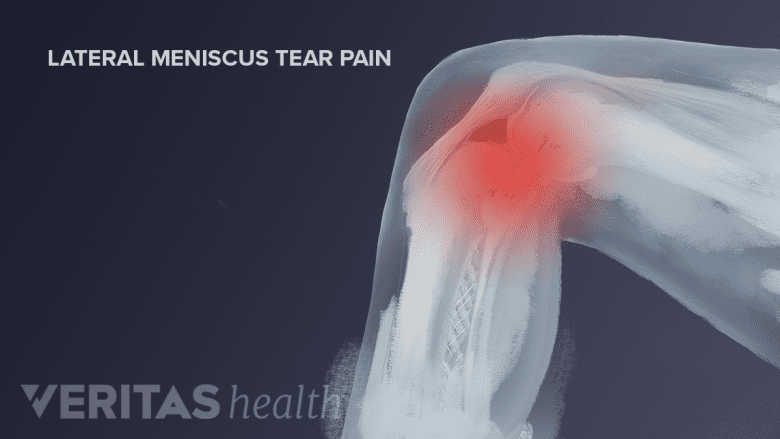The symptoms of a meniscal tear will depend largely on the specific individual as well as the location(s) and extent of the damage to the menisci.

Pain from a lateral meniscus tear occurs along the outer edge of the knee.
In This Article:
- Understanding Meniscus Tears
- Causes of Meniscal Tears
- Symptoms of Meniscal Tears
- Diagnosing Meniscal Tears
- Meniscal Tear Treatment
- Knee Meniscus Tear Video
Common symptoms of a meniscal tear may include:
- Localized pain near the area of the tear. In tears of the lateral meniscus, this discomfort will be present along the outside edge of the knee. Pain will manifest on the inside edge of the injured knee for tears of the medial meniscus.
- Immediate pain after the injury. A torn meniscus will often be obvious from the moment that the injury occurs. In these instances, the tearing of the meniscus is typically accompanied by the feeling of a pop or snap within the leg during an overexerting twisting or stretching motion.
- Slow onset of symptoms. Conversely, for some, the meniscus can tear without much of a sign or initial pain. This slow onset of symptoms is more common in older individuals and those with damaged knee cartilage from osteoarthritis.
- Pain with movement. The pain will reflect the location of the tear but extend throughout the knee with movement. In the event that the knee has locked, bending it will cause searing pain to worsen.
- Pain after resting. Pain will likely diminish somewhat with rest; however, it will return with movement in most cases. Movement may also exacerbate swelling.
- Fluid accumulation within the knee joint. This accumulated fluid will cause the entire area to swell up and reduce mobility. This symptom, which may occur as a result of a number of knee injuries, is known as “water on the knee.”
- Knee locking. If a piece of the meniscus breaks free of the disc structure due to a tear, it may lodge within the joint of the knee itself. This lodging can cause knee locking, in which a person loses the ability to fully straighten the leg when sitting or standing.
Symptoms of meniscal tears will vary based on the location of the tear, its severity, the overall health of the individual and the time that has elapsed since the injury.
It is common for other parts of the knee, such as the ACL, to be injured during a traumatic event that causes a meniscal tear. A physician will usually check for supplemental injuries during the diagnostic process.

